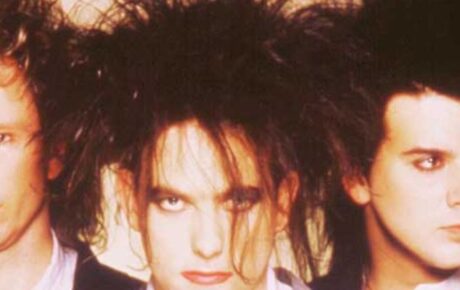With each technological era comes a new Tron movie instalment to mirror the ways humans are thinking and developing software and machines of that given moment. Director Joachim Rønning’s 2025 TRON: Ares reflects on present day attempts and failures in tech billionaires and corporations speed-racing to create the first superintelligence and embracing the weaponisation of artificial intelligence. Set 15 years after the 2010 Tron: Legacy continuation of Tron (1982), Ares introduces a Dillinger Master Control Program (MCP) lead character (Jared Leto) who is sent on a mission to steal ENCOM’s permanence code. Ares looks to make AI machines gain physical permanence outside of the machine they’re coded into. Tron has always been future-forward, as has the franchise’s memorable soundtracks, this time ‘round by industrial rock band Nine Inch Nails.
Led by the innovative and genius mind of Trent Reznor, who was the sole official member until 2016 when he officially brought on his film composing partner Atticus Ross, Nine Inch Nails has always succeeded in transcending what a traditional industrial sound is and can become through experimentation and risk. Their debut album, Pretty Hate Machine (1989), is 80s industrial synth which sounds drenched in mud and it nods to some of Reznor’s inspirations, such as Ministry, David Bowie and Depeche Mode. After the success of their 1992 EP, Broken, Reznor’s distinctive musical language and textures broke through commercially with the sophomore concept album, The Downward Spiral (1994). Two years after the success of the second record, Reznor went on to compose his first official soundtrack under Nine Inch Nails for the videogame Quake (1996). Over the years Nine Inch Nails have contributed original songs for film soundtracks, such as Natural Born Killers (1994), The Crow (1994) and David Lynch’s Lost Highway (1997). With 11 albums and 6 EPs to Nine Inch Nails’ name, over the past decade Reznor and Ross have slightly pivoted their time to film scoring. After winning Academy Awards for their The Social Network (2010) and Soul (2020) scores, Reznor and Ross have gone on to score multiple films for directors such as David Fincher and Trey Edward Shults. Their Golden Globe winning 2024 score for Luca Guadagnino’s Challengers became a cultural moment because the score had a life of its own outside of its ties to the movie, resonating with a younger audience through the likes of TikTok. The Challengers score proved Reznor’s capabilities to continue producing unconventional dancefloor anthems alongside Ross, as had unintentionally happened when Nine Inch Nails’ 1994 single ‘Closer’ was released (which, to this day, is still regarded as one of the most frenzied and seductive songs of all time).
Before deep diving into the Ares soundtrack, it needs to be placed within its wider context through a brief history of Tron. Since its first instalment with Steven Lisberger’s 1982 Tron, the Disney franchise has become a beloved series which weaves philosophical themes of technological advancements and the consequences these ideas pose on humanity and the larger world. Tron (1982) follows Kevin Flynn (Jeff Bridges), a videogame developer and programmer who finds himself transported into and trapped within a software’s mainframe. Now a trilogy of feature films, with additional in-universe video games, books and 2012’s animated series Tron: Uprising, this year’s TRON: Ares continues and builds upon its predecessors themes much to the soundtrack contributions by the synth-heavy industrial genius of Nine Inch Nails.
The soundtracks which soar through the Tron feature films are larger and more crucial than a typical motion picture soundtrack. Because of Tron’s themes of technological advancement and forward-thinking, the soundtracks of Tron are a pillar which can make or break the movie’s magic of immersing the audience into the movie’s world. The innovative electronic music which entwines with Tron’s vision of technological futures and videogaming have always matched the movie, such as the groundbreaking original Tron (1982) soundtrack composed by Wendy Carlos. Carlos’ soundtrack was composed with the London Philharmonic Orchestra and blended synths, such as Hal Alle’s Crumar General Development System, with contemporary orchestral music. Two additional soundtrack songs were performed by the rock band Journey. This was followed with Joseph Kosinski’s 2010 Tron: Legacy soundtrack, composed and performed by the legendary French electronic duo, Daft Punk. Their soundtrack, which felt inspired by Carlos’ score and influences like Kraftwerk, was nominated for an Academy Award and has garnered longevity outside of its place in Legacy (such as the song ‘Derezzed’). Nine Inch Nails’ Ares score leans into their favored analog and digital synthesisers. NIN are yet to clarify which instruments and tools they used, but it’s guaranteed Reznor’s beloved Minimoog Voyager was involved. Another distinctive quality to this new sound of Tron is Nine Inch Nails’ intention of creating a brutal soundtrack that chose not to use orchestral music like Daft Punk and Wendy Carlos had previously done.
TRON: Ares sees Nine Inch Nails soundtrack a film for the first time, placing it outside of Reznor and Ross’ traditional film scoring. This decision is clear when watching Ares as the soundtrack is closer to Nine Inch Nails in DNA. Just as David Bowie saw the future of rock in Trent Reznor, Nine Inch Nails’ current musical partnership with electronic artist Boys Noize (who also released his own mix of the Challengers score and is currently on tour with the band) continues within the Ares soundtrack and feels like a similar torch-passing. Nine Inch Nails also utilised the musical skills of other electronic artists, such as Hudson Mohawke, BJ Burton and Ian Kirkpatrick for additional production on the soundtrack. Of the 24 soundtrack songs, only 4 include lyrics; yet it’s a balanced amount of vocals for an action-packed soundtrack which would become too busy with constant overlaid vocals.
‘Init’ soundtracks the opening of TRON: Ares, with a text of code being entered to begin: # ./start_ares_program. The energetic soundtrack immediately jolts and ripples through your body and continues throughout Ares’ duration. Among the soundtrack are various reprises (‘Infiltrator’ and ‘Target Identified’) of the instrumental for the soundtrack’s lead single, ‘As Alive As You Need Me To Be’. The track is as Nine Inch Nails as it can get, with Reznor’s distinctly harsh and biting vocal performance carried by the thumping industrial dancebeat underneath. With Ares’ plot surrounding the attempt to give AI systems real-world permanence in order to weaponise and prevent them from being derezzed (eliminated), the soundtrack reinforces these valid and real human concerns of machine integration through wall-to-wall droning which can at times make the audience uncertain if they should feel like dancing or falling into distress. The industrial soundtrack strikes through the cinema’s surround sound on songs like ‘Target Identified’ which is heavy and dense in its synth-work. The song cuts into a roaring revving motorbike sound, which bleeds into the diegetic noise of light cycles throughout a pivotal and charged chase sequence with Julian Dillinger’s (Evan Peters) programs Ares and Athena (Jodie Turner-Smith), and ENCOM’s CEO, Eve Kim (Greta Lee).
Certain songs feel inspired by other electronic artists, such as the vintage sounds of Vangelis and Tangerine Dream on ‘100% Expendable’ and the heavy bass and trip-hop drumming reminiscent of Massive Attack on ‘I Know You Can Feel It’. Many emotive and sad moments are piano-driven, with tracks like ‘Echoes’, ‘Still Remains’ and ‘Permanence’ with its stuttering and broken strings. Similar to Nine Inch Nails’ instrumental Ghosts I – VI (2008 – 2020) series, Reznor’s piano work has always held particular motifs which are distinct to his artistic identity. ‘Echoes’ stands out as a breath of peace in comparison to the synth and industrial production of the other soundtrack songs. One significant non-soundtrack song appears in TRON: Ares – Depeche Mode’s 1981 synth-pop single ‘Just Can’t Get Enough’. Ares hears the song on the car radio during a car chase sequence, to which he says he finds the song invigorating. When he’s later asked by a digital copy of Kevin Flynn as to why he loves Depeche Mode, Ares explains: “I can’t put my love for Depeche Mode in words – it’s just a feeling.” Ares chooses to embrace his emotions – his programmed want for all that makes us human, impressing Flynn into giving him the hidden ENCOM permanence code he was originally ordered to extract for weaponisation by Dillinger.
The climax of Ares is not only action-packed and wildly entertaining, with Dillinger systems wreaking havoc and bursting coded light throughout the city as the soundtrack thunders on, but it also features a cameo from Reznor and Ross as F-35 pilots trying to destroy Athena and her aircraft. Without spoiling the movie, ‘Out In The World’ soundtracks the final scene where a particular character has found a certain purpose and goal outside of their programming. One of the most emotive and impactful songs from the soundtrack is ‘Who Wants To Live Forever?’, featuring vocals from Spanish singer-songwriter Judeline. The lyricism tugs on your heartstrings, with or without knowing the context of its place within the movie, purely because of how relatable it is. The song poses the question many humans are faced with at some point in their life: mortality. Existentialism always has a home within Tron’s wider universe, considering how technology advances humanity within its movie lore. Is there a particular point where advancement is too much for us? The song plays during the end-credits and leaves you feeling slightly anxious and concerned.
While the movie comes to an end, the consequences of superintelligence and the merging of online/offline feels all too real. James Cameron’s The Terminator comes to mind – yet Ares proves not all thoughts of these possible futures should focus on weaponised dystopia. As Judeline lulls during the credits: “who wants to live forever?”, you may ask yourself, ‘would I discard my mortality to obtain a machine’s immortality?’. TRON: Ares may not position itself to answer this existential question, but the movie’s climatic decisions regarding the depth and fragility of humanity versus Julian Dillinger’s intentions may speak for themselves. Trent Reznor responds to Judeline’s lyric with “I might just fade away,” which hits hard because what is the point of being immortal as a piece of software if you’re no longer flesh and bone you – only a mere line of code?












